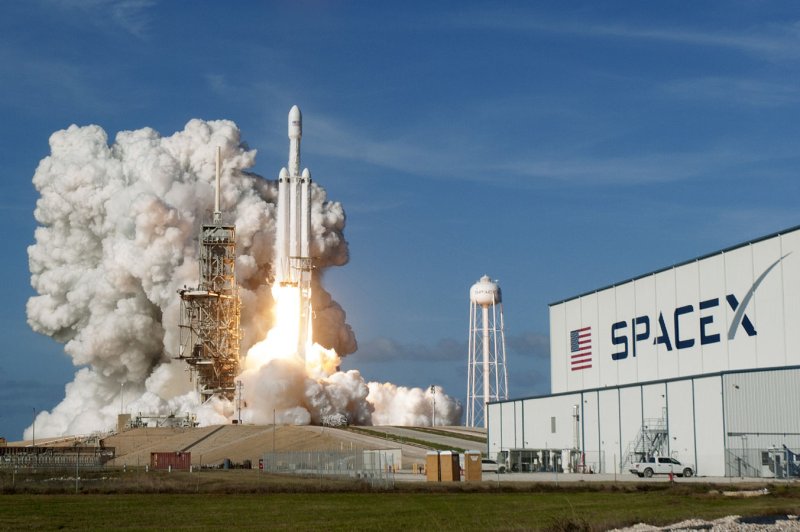1 of 3 | SpaceX launched its next-generation Falcon Heavy rocket from Kennedy Space Center's Launch Complex 39A on February 6. File Photo by Joe Marino/Bill Cantrell/UPI |
License Photo
CAPE CANAVERAL, Fla., April 4 (UPI) -- The second launch of a SpaceX Falcon Heavy -- the largest and most powerful rocket in use -- is planned for Sunday evening in Florida. It's the first time Block 5 booster will be used for the rocket, and it's also its first commercial payload.
The Block 5 booster is the latest-generation Falcon 9, intended to be reused several times. A Falcon Heavy is basically three Falcon 9's strapped together.
The rocket will carry the Arabsat 6A, a communication satellite for the Riyahd, Saudi Arabia-based company of the same name.
The launch window is 6:36 to 8:35 p.m. EDT Sunday, based on airspace closure warnings. If the launch hits a snag, a backup attempt could occur Tuesday. Delays or postponements can happen because of weather, technical problems or other issues.
The rocket is to lift off from Launch Complex 39A at Kennedy Space Center, directly across the Indian River from downtown Titusville, Fla.
On the Falcon Heavy's maiden voyage into space in February 2018, an estimated 100,000 visitors came to watch, and that was on a Tuesday. That launch had the additional pizzazz of being the biggest rocket since the Saturn era ended in the 1970s. It was carrying Elon Musk's red Tesla Roadster with the crash dummy Starman at the wheel.
"The launch is another test of SpaceX's emerging dominance in commercial space," said Erik Seedhouse, assistant professor at Embry-Riddle Aeronautical University in Daytona Beach, Fla.
He said NASA's own rocket under development, the Space Launch System with Orion capsule, has hit many delays, creating a possible opening for more government missions to use the Falcon Heavy.
Successful booster landings will be important, he said.
During the Falcon Heavy maiden launch, the main booster botched its landing on a barge in the Atlantic Ocean, but the two side boosters flew perfectly back to twin landing pads at Kennedy Space Center.
A launch on a Falcon Heavy carries a price tag of $90 million, compared to competitor United Launch Alliance's Delta IV Heavy, which costs more than $300 million. Falcon Heavy is taller than the shuttle launch rocket was, but carries a little less thrust or power.
As excitement builds heading to launch day. business owners in the area, like restaurateur Clay Townsend, are preparing for extra customers.
"It should be a spectacular launch in the evening around sunset," said Townsend, owner of the Dixie Crossroads restaurant, which is prepping a large batch of its famous rock shrimp for launch day.















